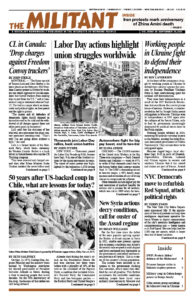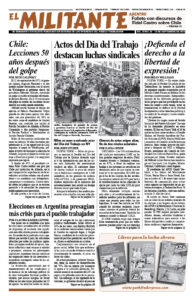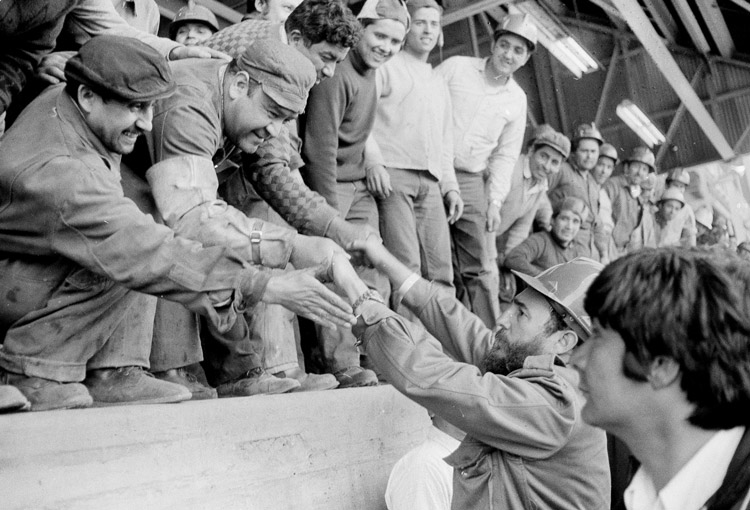On Sept. 11, 1973, Chilean Gen. Augusto Pinochet and the military brass backed by Washington overthrew the elected government of President Salvador Allende in blood, dealing a blow to working people that lasted decades. On the 50th anniversary of the coup, the lessons of that defeat are still being debated.
Allende died during the army’s attack on the Presidential Palace. He had won election just three years before with a plurality of 36% of the vote as the candidate of the Popular Unity, a coalition that included Allende’s Socialist Party, the Communist Party and two bourgeois parties — the Radical Party and United People’s Action Movement.
Thousands of documents released over the last 20 years —including two just released Aug. 25 by the CIA — expose Washington’s role, first in trying to block Allende’s election, then in the coup that brought Pinochet to power and the bloody repression that followed.
In late 1971, Cuban President Fidel Castro toured Chile at Allende’s invitation, discussing the experiences of Cuba’s socialist revolution with the president and meeting with workers, peasants and students. Castro warned of the dangers already brewing and the need to prepare politically to defeat them.
The year before Castro’s visit, working people had poured into the streets to celebrate when it became clear that Allende was going to win the election, reflecting a broad radicalization of workers and farmers there.
The election of Allende “was like a door slightly ajar,” Castro told union leaders in Santiago Nov. 23, 1971, “an opening.” But already, he said, the reactionaries had begun “to conspire, to work out macabre plans.”
The Popular Unity government implemented significant reforms. This included nationalizing foreign copper, iron, nitrate and coal mining companies and passing an initial land reform law. Some peasants went farther, seizing more land.
Workers received a significant wage increase. Children were given a half quart of milk a day. Millions of inexpensive books were published and sold at newspaper kiosks. Thousands of political prisoners were released. And Allende established diplomatic relations and trade with Cuba and spoke out against the U.S. rulers’ war on Vietnam.
Capitalist sabotage
Chile’s capitalist class began to sabotage production, and workers responded, occupying factories and organizing to produce without the bosses. They set up cordones industriales (industrial councils), which began fighting for workers control of production and distribution of goods.
Still, in a May 21, 1971, speech to the Chilean Congress, Allende said, “History will permit us to break with the past and construct a new model of society” through elections. The new government’s actions would recognize “legality” and “certain limits,” a euphemism for subordinating the struggles of workers and peasants to maintaining capitalism.
Allende said his long-term goal was to “bring about the economic and social transformation of Chile, to open up the road to socialism.”
But despite all the radical rhetoric, Allende’s coalition was a class-collaborationist popular front, which sought reforms, not to wrest political power out of the hands of the capitalist class.
While Allende, the Communist Party and others in his coalition were sowing illusions that the Armed Forces and the Carabineros, the national police, had a “patriotic conscience” and would not attack the people, U.S. imperialism and the Chilean capitalist class were preparing for battle.
At a White House meeting with presidential adviser Henry Kissinger, CIA Director Richard Helms and Attorney General John Mitchell on Sept. 15, 1970, a week after Allende won the election, President Richard Nixon ordered them to do whatever it took to “make the economy scream” to get rid of Allende.
Washington began an economic war on Allende’s Chile, cutting all U.S. aid, except for the military and financing opponents of the Popular Unity government. That included underwriting a 26-day bosses’ “strike” by truck owners that paralyzed the economy in fall 1972.
During his 1971 trip, Castro warned repeatedly about what was unfolding and the need to organize working people in their millions to advance the revolution forward, as they had done in Cuba.
At a farewell rally of thousands in Santiago Dec. 2, 1971, Castro said, fascist forces “are trying to make headway and gain ground among the middle layers and take the streets. They are trying to demoralize the revolutionaries. … The success or the failure of this unusual process will depend on the ideological battle and the mass struggle.”
“Who will learn more and sooner?” he asked the crowd. “The exploiters or the exploited? … The people or the enemies of the people?”
At that rally, and in private discussions with Allende, Castro explained the need to organize working people in their millions. “I have said that there is no case in history,” he told the crowd, “in which the reactionaries, the exploiters, the privileged members of a social system, resign themselves peacefully to changes.”
He explained what making a socialist revolution meant for the consciousness and capacity of Cuban toilers to resist all attacks. In revolutionary Cuba, “it would take two hours for us to get together 10 times as many people as there are here now. And I also say that we can mobilize 600,000 men in arms within 24 hours!”
The Popular Unity leaders brushed aside Castro’s warnings. While U.S. imperialism and the local capitalist class systematically prepared to overthrow the government, Allende held the masses back.
Working people paid a heavy price. Some 3,100 people were murdered or disappeared in the course of the coup and the following 17 years of Pinochet’s rule. Another 9,800 survived torture.
The words of Castro more than 50 years ago still ring true. Working people, he said, “need to keep the enemy from taking the initiative.”
“Apply the laws of history; apply the wise principles of Marxism. Do it intelligently and creatively, and you’ll see, you’ll win.”


